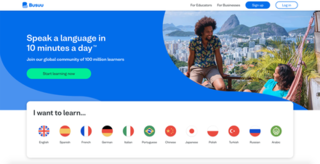Language education – the process and practice of teaching a second or foreign language – is primarily a branch of applied linguistics, but can be an interdisciplinary field. There are four main learning categories for language education: communicative competencies, proficiencies, cross-cultural experiences, and multiple literacies.

English as a second or foreign language is the use of English by speakers with different native languages. Language education for people learning English may be known as English as a second language (ESL), English as a foreign language (EFL), English as an additional language (EAL), English as a New Language (ENL), or English for speakers of other languages (ESOL). The aspect in which ESL is taught is referred to as teaching English as a foreign language (TEFL), teaching English as a second language (TESL) or teaching English to speakers of other languages (TESOL). Technically, TEFL refers to English language teaching in a country where English is not the official language, TESL refers to teaching English to non-native English speakers in a native English-speaking country and TESOL covers both. In practice, however, each of these terms tends to be used more generically across the full field. TEFL is more widely used in the UK and TESL or TESOL in the US.

CELTA is an initial teacher training qualification for teaching English as a second or foreign language. It is provided by Cambridge Assessment English through authorised Cambridge English Teaching Qualification centres and can be taken either full-time or part-time. CELTA was developed to be suitable both for those interested in Teaching English as a Foreign Language (TEFL) and for Teaching English to the Speakers of Other Languages (TESOL). The full name of the course was originally the Certificate in English Language Teaching to Adults and is still referred to in this way by some course providers. However, in 2011 the qualification title was amended on the Ofqual register to the Cambridge English Level 5 Certificate In Teaching English to Speakers of Other Languages (CELTA) in order to reflect that the wider range of students that teachers might have, including younger learners.
Sheltered instruction is an approach to teaching English language learners which integrates language and content instruction. The phrase "sheltered instruction," original concept, and underlying theory of comprehensible input are all credited to Stephen Krashen.
DELTA is an English language teaching (ELT) qualification for experienced Teachers of English as a Foreign Language (TEFL) and Teachers of English to Speakers of Other Languages (TESOL). It is provided by Cambridge English Language Assessment through authorised Cambridge English Teaching Qualification centres and can be taken either full-time or part-time. The full name of the course was originally the Diploma in English Language Teaching to Adults and is still referred to in this way by some course providers. However, in 2011 the qualification title was amended on the Ofqual register to the Cambridge English Level 7 Diploma In Teaching English to Speakers of Other Languages (DELTA) in order to reflect that the wider range of students that teachers might have, including younger learners.
The ELTons are international awards given annually by the British Council that recognise and celebrate innovation in the field of English language teaching. They reward educational resources that help English language learners and teachers to achieve their goals using innovative content, methods or media. The ELTons date from 2003 and the 2018 sponsors of the awards are Cambridge English Language Assessment and IELTS. Applications are submitted by the end of November each year and they are judged by an independent panel of ELT experts, using the Delphi Technique. The shortlist is published in March and the winners announced at a ceremony in London in June. The 2018 awards were held in a new venue, Savoy Place, Institute of Engineering and Technology, London, UK.

HOOP is an official NBA publication, produced by Professional Sports Publications. The magazine features in-depth interviews with players, and also highlights the players' lives off the court.
E-learning theory describes the cognitive science principles of effective multimedia learning using electronic educational technology.
Livemocha was an online language learning community, providing instructional materials in 38 languages and a platform for speakers to interact with and help each other learn new languages. According to the site, it had approximately 12 million registered members from 196 countries around the globe. It was free to join and use; however, it offered the option to pay for various benefits. In 2012, 400,000 users visited the site daily.
Babbel GmbH, operating as Babbel, is a German subscription-based language learning app and e-learning platform, available in various languages since January 2008.

Busuu is a language learning platform on web, iOS and Android that allows users to interact with native speakers.
Scott Thornbury is an internationally recognized academic and teacher trainer in the field of English Language Teaching (ELT). Along with Luke Meddings, Thornbury is credited with developing the Dogme language teaching approach, which emphasizes meaningful interaction and emergent language over prepared materials and following an explicit syllabus. Thornbury has written over a dozen books on ELT methodology. Two of these, 'Natural Grammar' and 'Teaching Unplugged', have won the British Council's "ELTon" Award for Innovation, the top award in the industry.
LENA is a developer of advanced technology and programs to accelerate language development of children 0–3 and to close opportunity gaps.
Dogme language teaching is considered to be both a methodology and a movement. Dogme is a communicative approach to language teaching that encourages teaching without published textbooks and focuses instead on conversational communication among learners and teacher. It has its roots in an article by the language education author, Scott Thornbury. The Dogme approach is also referred to as "Dogme ELT", which reflects its origins in the ELT sector. Although Dogme language teaching gained its name from an analogy with the Dogme 95 film movement in which the directors, actors, and actresses commit a "vow of chastity" to minimize their reliance on special effects that may create unauthentic feelings from the viewers, the connection is not considered close.
Language pedagogy is the discipline concerned with the theories and techniques of teaching language. It has been described as a type of teaching wherein the teacher draws from his prior knowledge and actual experience in teaching language. The approach is distinguished from research-based methodologies.

Pimsleur Language Programs is an American language learning company that develops and publishes courses based on the Pimsleur method. It is a division of Simon & Schuster, a publishing company which is a subsidiary of Paramount Global. Pimsleur offers courses for 50 languages with English as the source language, and 14 ESL courses.
Teaching English as a second language (TESL) or Teaching English to speakers of other languages (TESOL) are terms that refer to teaching English to students whose first language is not English. The terms TESL, TEFL, and TESOL distinguish between the location and student population of a class. TEFL describes English language programs that occur in countries where English is not the primary language. TEFL programs may be taught at a language school or with a tutor. The minimum TEFL requirement is a 100-hour course, however the 120-hour course is strongly recommended because it will help you get hired for the highest-paying teaching position available. TESL and TESOL include English language programs that occur in English-speaking countries. Oftentimes, these classes serve people who have immigrated there or whose family speaks another language at home. TESOL is a general term that describes TEFL and TESL programs and is a widely accepted term in the field of English language teaching. TEFL teachers may be native or non-native speakers of English. ESL and TESL are outdated terms because they do not include students who speak more than one language prior to their study of English. Students who are learning English in their home country, typically in school, are EFL students. More generally, students learning English are referred to as ELLs.
A display question is a type of question requiring the other party to demonstrate their knowledge on a subject matter when the questioner already knows the answer. They are contrasted with referential questions, a type of question posed when the answer is not known by the questioner at the time of inquiry.

Kata Csizér is a Hungarian linguist. She is currently a professor at the Department of English Applied Linguistics of the School of English and American Studies at Eötvös Loránd University, Hungary. Her research focuses on applied linguistics with a special focus on motivation in second-language learning and teaching students with special needs.
John Gell, also known as Jack Gell or Juan y Geill was a Manx speaker, teacher, and author who was involved with the revival of the Manx Language on the Isle of Man in the 20th century. His book Conversational Manx, A Series of Graded Lessons in Manx and English, with Phonetic Pronunciation has been used by learners of the Manx language since it was published in 1953.






